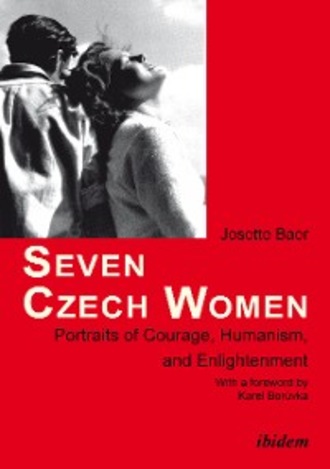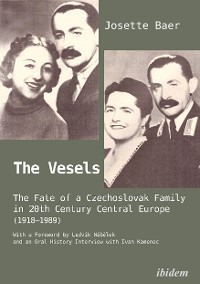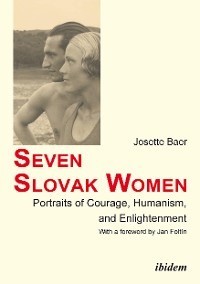
Полная версия
Seven Czech Women
In general, the liberation and self-liberation of women in Europe began around 1900. In this regard, Switzerland, one of the oldest democracies, holds a sad record: Swiss women achieved the vote only in 1971[11] – yet on the grounds of a referendum, that is, Swiss women fought for their political equality, convincing the men to vote for their future right to vote. In terms of procedural ethics, the Swiss women’s vote was achieved in a democratic fashion following the rules of the Swiss constitution; female and male citizens fought for female political equality, it was not bestowed on them.
Regardless of their national identity, European women had to face the same prejudices of the male-dominated societies, which ascribed to them only a limited space: charity and the family. For the purpose of this volume, I would like to specify what I consider the five most important aspects of female emancipation in Europe:
1.The conquest of the public space = being visible in society, clubs, associations and organisations; second half of the 19th century;
2 .The right to higher education = the access to high schools and universities; after WWI, early 20th century;
3.The right to political participation = the right to vote and run for office; after WWI, early 20th century;
4.The right to work and earn one’s salary = financial independence; early 20th century;
5.The right to prevent pregnancy with the contraceptive pill and the right to legal abortion = autonomy of the female body; 1960s and 1970s.
In WWI and WWII women had replaced the men in the work force and contributed to the war effort; after the war they were increasingly demanding equal status. The fourteen women portrayed in my two volumes were and are active in crucial areas of a modern European society. Their life stories illustrate how much women and the progressive men who supported them achieved in the last hundred and fifty years in their fight for gender equality in all spheres of society:
1.Literature: Elena Maróthy-Šoltesová (1855–1939), Slovakia in Upper Hungary;
2.Music: Ema Destinn (1878–1930), the Czech lands in the Austrian part of the Habsburg Empire and Czechoslovakia;
3.Politics: the Czechs Eva ‘Mimi’ Jiránková (*1921) and Nataša Lišková (*1949) as historical witnesses; the Slovaks Magdaléna Vášáryová (*1948) and Iveta Radičová (*1956) as politicians;
4.Political resistance: Chaviva Reiková (1914–1944), the Slovak state; Milada Horáková (1901–1950), Czechoslovakia;
5.Science: Mária Bellová (1885–1973); Slovakia in Upper Hungary and Czechoslovakia;
6.Social care, NGO, media: Alice Garrigue Masaryková (1879–1966), Czechoslovakia; Tereza Maxová (*1971), Czech Republic; Adela Banášová (*1980), Slovak Republic;
7.Sports: Vera Čáslavská (*1942), Czechoslovakia.
Unlike Slovak women, Czech women enjoyed a much more liberal atmosphere in the last decades of the 19th century, as their language was not threatened. The Czechs had their own journals, newspapers and a market for books in Czech; this was the reason why the Czech national movement could successfully negotiate the establishment of a Czech section of the Charles-Ferdinand University in Prague. From 1882 on, Czech and also Slovak students, who did not speak German or Hungarian, could get a university degree in Prague. The physician Vavro Šrobár (1867–1950) and the astronomer and general of the French Army Milan Rastislav Štefánik (1880–1919), two Slovak adherents of Masaryk’s, had graduated at Charles-Ferdinand University and became principal figures in the building of the Czechoslovak Republic.[12]
Under Communism, Czechoslovak women enjoyed constitutionally granted equality with men. Because of the duty to work under Socialism, women liberated the men from the role of the principal nurturer of the family. Yet, society still conceived of their role as the traditional one of mother and wife. Women were occupied with family matters during their entire lives; after retirement, they took care of their grandchildren.
In the first two decades of its rule, the Communist Party was eager to mobilize women; since the Party identified the concept of ‘feminism’ with Western Capitalism and the ‘bourgeois’ women’s movement in the First Republic, it invented the concept “working among women (práce mezi ženami)” in its mobilizing effort.[13] “Feminism” was not a popular term among critically minded intellectuals either, since the Socialist regime was not popular, in particular after the invasion of August 1968 and the politics of normalization. Václav Havel, the most prominent dissident of Charter 77, explained in 1985 that Czechoslovak women considered feminism as “dada, the fear of becoming unintentionally ridiculous when publicly addressing women’s oppression by men”.[14] In a political system that oppressed the civil and political rights of all, women’s issues were neither interesting nor of vital importance.
The political change of 1989 affected women who were being marginalized by the new democratic and economic spirit.[15] They were the first to lose their jobs when the privatization of the large state-owned enterprises began in the 1990s. Besides criminality, pornography, greed, and asocial behaviour, the hitherto unknown phenomenon of sexism wormed its way into the post-Communist societies: a sad consequence of the regime change is the trafficking of young women who apply for a job in the rich states of the West and often land in brothels where they are forced into prostitution.[16]
For political reasons, Czech and Slovak scholars started only in the mid-1990s to investigate women’s roles and functions in society.[17] In the years after the Velvet Revolution of 1989, Czech citizens allegedly rejected feminism; pioneers of gender studies, such as the former dissident Jiřina Šiklová and Hana Havelková did not reject feminism but explained why Czech women rejected a feminist view.[18] Also, as Oates-Indruchová points out, the assertion that Czech women rejected feminism has never been critically analysed by empirical research. The media, publishers and academic institutions of the post-socialist state played a major role in demonizing gender studies in the early 1990s; there was no funding available, the interest of the universities to offer feminist topics in the curricula was very low, and some institutions expressed their doubts about the scientific legitimacy of the field. Since then, much has changed in the academic landscape of the Czech Republic, and a second generation of gender scholars is at work.
I. Ema Destinn (1878–1930) – a Bohemian in New York
“What Czech Would Not Love Music.”[19]
I. 1 The historical context
On 26 February 1878, when Emilie Kittlová (later Ema Destinn) was born in Prague, Tomáš Masaryk (1850–1937),[20] a young Doctor of Philosophy, was on the way to New York to join his fiancée Charlotte Garrigue (1850–1923), who was recovering from an accident. They had met in Leipzig in 1877, where he had been enrolled in postdoctoral studies in economics and philosophy. The young American woman from a protestant family, which was progressive with regard to women’s rights, was a talented pianist. Her family was wealthy, and Charlotte had enrolled at the Leipzig Conservatory, planning to train as a concert pianist.[21] She would give up her career plans to be the wife of the Czech philosopher, with whom she shared common views about religion, social issues, and politics. On 15 March 1878 Charlie, as her parents called her, and Tomáš married in New York. They returned to Vienna, where Masaryk began to write his second post-doctoral thesis. He had submitted his first one shortly before he learnt about Charlie’s accident. He had rushed to the USA and could not attend his post-doctoral thesis’ defence, therefore, his first thesis had become invalid. Little did Vienna University and the Austrian authorities know that the philosopher from a working-class background who was teaching at high schools for a low salary would lead the Czechs and Slovaks to sovereignty in a common state called Czechoslovakia, ending five centuries of Habsburg rule in Central Europe in 1918.
The career and life of the talented Emilie Kittlová are a good illustration of the professional opportunities open to Czech women in the last decades of the 19th century, in particular with respect to social mobility. Emilie’s family was of modest means: they were comfortable, but not rich; her talent would make her a millionairess.
Czech delegates to the Austrian Reichsrat were trying to push through political rights to counteract the dominance of the German minority in the Czech lands; they were demanding a status of autonomy and self-government within the monarchy’s political framework. In the last two decades of the 19th century, mass parties were emerging in the Czech lands that would later compete with each other in the first free elections in 1907. Naturally, women did not yet have the vote; they would gain access to higher education and political participation only in the 20th century.
Girls and women from the lower social classes received compulsory primary education and then would find jobs as housemaids, seamstresses, shop assistants, cleaners and cooks – in brief, the usual female occupations in the service of others. Daughters of the aristocracy and girls from families that had achieved some wealth and formed the social stratum of the entrepreneurial middle class were focussed on the two events that would determine their lives: marriage and motherhood. Girls were taught how to instruct the personnel, oversee a respectable household, bring up children and be faithful and supportive wives. To marry well, that is, find a wealthy husband, secured the social and financial standing of the bride and groom’s families. Besides the family, charity was another area where respectable society ladies could engage in helping the poor in the spirit of Christian love. Thanks to her father, the young Emilie would be able to choose a different life for herself.
Who was Ema Destinn? In this chapter, I will focus on her career as an opera singer, which peaked when she signed a contract with the prestigious Metropolitan Opera in New York in 1908. A further important aspect of her life was her patriotic activities during WWI. After 1918, the authorities of the new state, whose creation she had continuously and courageously supported, ignored her, causing a slow and painful decline in her health and mental wellbeing. Ema’s sad life in the Czechoslovak Republic demonstrates how badly Czech society treated the diva who had made the ‘mistake’ of beginning her career under the old monarchy.
I. 2 Emmy or Ema? Destinn’s success, work for independence and decline
Emilie’s father was successful in the mining business and, with hard work and astute financial investments, had acquired some wealth. Emanuel Kittl supported his first-born child in her extraordinary talent for music and literature; he made no difference between girls and boys.
Emilie Kittlová was pretty, with a shock of dark brown hair, matching dark brown eyes and perfect fair skin. Her voice was strong yet light, sensitive but also dramatic. She could sing anything; her extraordinary soprano mastered the heavy and lyrical Wagnerian parts as well as the lighter Italian operas of Giuseppe Verdi (1813–1901) and Giacomo Puccini (1858–1924). Her interpretation of the roles, acting ability and absolute dedication to the music would endear her to the members of the international aristocracy and the wealthy American public attending her performances. She would rise to international stardom under the name of Emmy Destinn.
Ema would translate Italian and German libretti into Czech, and Bedřich Smetana (1824–1884) and Antonín Dvořák’s (1841–1904) libretti into German, introducing the music of the most famous Czech composers to an international audience. This was an extraordinary accomplishment since, in the eyes of international opera fans, the Czech lands were but an Austrian province. A laird in Scotland or a millionaire in Oregon knew the Austrian Empire from the map, but had no idea about the Czechs as a nation. To them, the Czech lands were some territory in Central Europe governed by Austria.
Wolfgang Amadeus Mozart (1756–1791) had experienced, in the 18th century, that the Czechs were his most accomplished and educated public. Like Ema, Mozart achieved success abroad, not in his native Salzburg and not at court in Vienna, but in Prague, the province of the Austrian monarchy. He deeply appreciated the Czechs’ dedication to music and allegedly said “My people, the citizens of Prague, understand me” (Meine Prager verstehen mich) after the première of his Don Giovanni at the Ständetheater (stavovské divadlo) in Prague in 1787; when Mozart was in the Bohemian capital, he used to stay at the Villa Bertrámka, a mansion on the left bank of the Vltava.[22]
Ema would write poetry, plays, fairy tales and memoirs, buy a castle in southern Bohemia, sing Smetana’s Libuše for President Masaryk and eventually die alone and impoverished at the age of 51, a month short of her 52nd birthday.
Young Emilie gave her first performance in public at the age of eight: she played the violin. Music was how the little girl expressed herself. When she signed her first international contract with the Court Opera House in Dresden, Saxony, in 1896, she was 18 years old and had accomplished five years of education in piano, violin, languages and voice. That same year she had attended an audition at the Czech National Theatre in Prague; she was not hired – apparently she was not good enough. Yet, young Ema was determined; she knew that she was extraordinarily talented and did not give up. She received no role while in Dresden, but would make her stage debut a year later at the Court Opera House in Berlin.
The Czech opera houses’ refusal to offer her a contract in the early stages of her career was painful, but steeled her and strengthened her resilience, a quality that would prompt her to try her luck abroad. Ignored at home, Ema would become prima donna assoluta at the Royal Opera House Covent Garden in London. She would perform at the Národní Divadlo (National Theatre) in Prague for the first time in 1901, after her great successes in Wilhelminian Germany.
She was particularly indebted to her teacher Marie Loewe, whose stage name was Destinn, a short form of the English destiny, fate. The fact that Ema adopted Destinn as her stage name[23] proves her life-long friendship with Marie and Thomas Loewe. When Ema learnt about Thomas Loewe’s death in June 1921, she immediately sent Marie a large sum to see her over the first difficult months,[24] although she was in dire financial straits herself. Two of Ema’s characteristic qualities were generosity and loyalty. Whenever a friend in need asked her for help, she did not think twice.
Ema’s lifestyle conformed to the cliché of the archetypal artist: emotional, impulsive, enthusiastic, caring only for art, completely impractical and absolutely indifferent to money. Money was to her but a means of gaining freedom, of being herself, of enjoying life without any further thought.
At the peak of her career, from 1908 to 1916, Ema was unmarried; she didn’t have children



